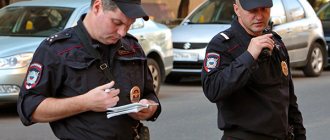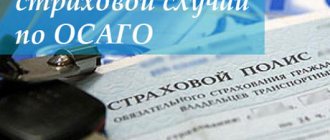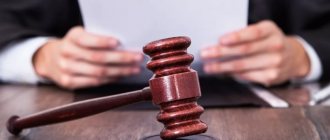Document verification: duties and rights of a citizen
“Citizen, show your documents” - this phrase, popular in Soviet films, can often be heard in real life. Let's try to figure out in what cases a police officer has the right to check documents and what rights an ordinary citizen has.
Just like that, without any reason, police officers do not have the right to check the documents of passers-by.
The whole question is: what is such a basis?
We will prepare a complaint against the actions of police officers
Urgent Competently Confidential
Order a complaint
Grounds for checking documents by a police officer
The grounds for checking documents are regulated in detail by law and, above all, by the Federal Law “On the Police”.
According to clause 2, part 1, art. 13 of this Law, a police officer has the right to check citizens’ identity documents in the following cases:
- there is evidence giving grounds to suspect them of committing a crime;
- there is information giving reason to believe that they are wanted;
- there is a reason to initiate administrative proceedings against these citizens;
- there are grounds for their detention in accordance with Art. 27.3 Code of Administrative Offenses of the Russian Federation or Art. 91 Code of Criminal Procedure of the Russian Federation.
It must be recognized that in Russia, as indeed in any other country in the world, at any given moment in time a large number of people are wanted in connection with a crime committed.
Therefore, the citizen’s supposed similarity in appearance with the wanted person turns into a kind of universal “master key” for checking documents.
Thus, the Law “On Police” gives police officers the right to check a person’s documents in almost any situation.
Fine for disobeying a police officer
At the same time, the legal requirements of serving police officers are mandatory.
Disobedience to a lawful order or requirement of a police officer in connection with the performance of their duties to protect public order and ensure public safety entails, in accordance with Part 1 of Art. 19.3 of the Code of Administrative Offenses of the Russian Federation, entails the imposition of an administrative fine in the amount of five hundred to one thousand rubles or administrative arrest for up to fifteen days.
Subsequently, if desired, the legality of such demands can be challenged, but the chances that Themis will be on your side, frankly speaking, are small.
If you were taken to the police station? Basic rules of conduct in the precinct.
- Answer briefly and monosyllabically, or you may not answer at all.
- Call your family or friends and tell them where you are
- Specify as much information as possible, namely why you were detained and what charges are being brought.
- Ask for a lawyer
- Don't sign anything
- Take photographs of all documents that are shown to you or that you suddenly signed.
Basic rules of law when dealing with police officers.
1) Police officers are obliged to be polite and treat citizens with respect: According to paragraph 1, paragraph 2 of Art. 5 Federal Law “On the Police”, clause 1. The police carry out their activities on the basis of observance and respect for the rights and freedoms of man and citizen. clause 2. Police activities that restrict the rights and freedoms of citizens are immediately terminated if a legitimate goal is achieved or it becomes clear that this goal cannot or should not be achieved by limiting the rights and freedoms of citizens. According to the Charter of the PPS, clause 226. An employee of the PPS unit in any conditions must be polite and tactful with citizens, address them as “you”, state their demands and comments in a convincing and understandable form, and avoid disputes and actions that offend their honor and dignity. In the event of a citizen’s appeal, the patrol (guard) police officer is obliged to state his position, rank, surname, listen carefully to him, take appropriate measures within the limits of his powers, or explain whose competence it is to resolve the issue raised. p. 229. When talking with citizens, police patrol officers are obliged to show calm and restraint, should not enter into arguments, lose self-control, respond to rudeness with rudeness and not be guided in their actions by personal hostile feelings. p. 230. If the offender reacts excitedly to the comments made to him, he must be given time to calm down and given the opportunity to give an explanation about his unlawful actions, and then explain the incorrectness of his behavior with reference to the relevant laws or other regulatory legal acts. Only after this can a decision be made to draw up a protocol, deliver the offender to the internal affairs department (department), or limit himself to a remark. 2) In what cases can the police stop you and ask you to show your passport? By virtue of clause 2 of part 1 of article 13 of the Federal Law “On the Police”, the police can: clause 2. Check the identity documents of citizens if there is data giving grounds to suspect them of committing a crime or to believe that they are wanted, or if there is a reason to initiate proceedings regarding an administrative offense against these citizens, as well as if there are grounds for their detention in cases provided for by federal law; check from citizens, officials, public associations and organizations permits (licenses) and other documents to perform certain actions or to carry out a certain type of activity, control (supervision) over which is entrusted to the police in accordance with the legislation of the Russian Federation; According to the Charter of the PPS, clause 233. When checking, citizens’ documents must be handled carefully and not made any marks on them. If money and other securities are invested in the document, you must invite the owner to take them himself. There are sufficient grounds to suspect a person of committing a crime in accordance with Art. 91 of the Code of Criminal Procedure of the Russian Federation are the following circumstances: - when a person is caught committing a crime or immediately after its commission; - when eyewitnesses, including victims, directly point to this person as having committed a crime; - when obvious traces of a crime are found on the suspect or his clothing, on him or in his home. 3) Police officers are required to introduce themselves and explain the reason for the appeal, Art. 5 of the Federal Law “On the Police” states: clause 4. When contacting a citizen, a police officer is obliged to: 1) state his position, rank, surname, present his official identification at the citizen’s request, and then state the reason and purpose of the appeal; 2) if measures are applied to a citizen that restrict his rights and freedoms, explain to him the reason and grounds for the application of such measures, as well as the rights and obligations of the citizen arising in connection with this. 5. A police officer, if a citizen approaches him, is obliged to state his position, rank, surname, listen carefully to him, take appropriate measures within the limits of his powers, or explain whose competence it is to resolve the issue raised. According to the PPS Charter, paragraph 227. When contacting a citizen, a patrol (guard) police officer is obliged to state his position, rank, surname, present his service ID at the citizen’s request, and then state the reason and purpose of the appeal. 4) The police must give the opportunity to familiarize themselves with the citizen’s documents that affect his rights and obligations, paragraph 7 of Art. 5 of the Federal Law “On the Police” states: clause 7. The police are obliged to provide every citizen with the opportunity to become familiar with documents and materials that directly affect his rights and freedoms, unless otherwise provided by federal law. 5) The police should not use physical force or insult people, Art. 5 of the Federal Law “On Police” states: Art. 5) A police officer is prohibited from resorting to torture, violence, or other cruel or degrading treatment. A police officer is obliged to suppress actions that deliberately cause pain, physical or mental suffering to a citizen. 6) A citizen may refuse to give explanations to the police, according to Art. 51 of the Constitution, paragraph 1. No one is obliged to testify against himself, his spouse and close relatives, whose circle is determined by federal law. 7) Personal search is regulated by clause 16 of Art. 13 of the Federal Law “On the Police” provides that the police have the right to carry out, in the manner established by the legislation on administrative offenses, personal searches of citizens, searches of things on them, as well as searches of their vehicles if there is information about what these citizens have with them weapons, ammunition, cartridges for weapons, explosives, explosive devices, narcotic drugs, psychotropic substances or their precursors or poisonous or radioactive substances, seize these items, means and substances in the absence of legal grounds for carrying or storing them; take part in the inspection of passengers, their hand luggage and baggage on railway, water or air transport, the subway, or carry out such an inspection independently in order to seize things and objects prohibited for transportation by vehicles.” According to Article 27.7. Code of Administrative Offences, clause 1. Personal search, examination of things that are in the possession of an individual, that is, an examination of things carried out without violating their structural integrity, is carried out if necessary in order to detect instruments of committing or objects of an administrative offense. clause 2. Personal search, search of things in the possession of an individual, are carried out by officials specified in Articles 27.2, 27.3 of this Code. clause 3. A personal search is carried out by a person of the same sex as the person being searched in the presence of two witnesses of the same sex. Inspection of things carried by an individual (carry-on luggage, luggage, hunting and fishing tools, obtained products and other items) is carried out by authorized officials in the presence of two witnesses. clause 4. In exceptional cases, if there are sufficient grounds to believe that an individual has weapons or other items used as weapons, a personal search and search of things on the individual may be carried out without witnesses. clause 5. If necessary, photography, filming, video recording, and other established methods of recording material evidence are used. clause 6. A protocol is drawn up about a personal search, search of things that are with an individual, or a corresponding entry is made in the protocol on delivery or in the protocol on administrative detention. The protocol on a personal search, examination of things in the possession of an individual, indicates the date and place of its preparation, position, surname and initials of the person who compiled the protocol, information about the individual subjected to personal search, the type, quantity, and other identifying characteristics of things , including the type, brand, model, caliber, series, number, other identification features of the weapon, the type and quantity of ammunition, the type and details of documents found during the inspection and carried by the individual. clause 7. In the protocol on a personal search, examination of things in the possession of an individual, a record is made of the use of photography, filming, video recording, and other established methods of recording material evidence. Materials obtained during a personal search, examination of things in the possession of an individual, using photography, filming, video recording, and other established methods of recording material evidence, are attached to the corresponding protocol. clause 8. The protocol on a personal search, examination of things in the possession of an individual, is signed by the official who compiled it, the person against whom proceedings are being conducted for an administrative offense, or the owner of the things subjected to search, by attesting witnesses. If the person against whom the proceedings are being conducted, the owner of the things subjected to inspection, refuses to sign the protocol, a corresponding entry is made in it. A copy of the protocol on the personal search, the search of things in the possession of an individual, is handed over to the owner of the things subjected to search, at his request.  Chief of the PPS, Commander of the PPSP unit
Chief of the PPS, Commander of the PPSP unit
Sign up for a consultation
What does a citizen need to know when he is asked to present documents?
The actions of a police officer and the procedure for contacting a citizen are determined by Part 4 of Art. 5 of the Law “On the Police”, according to which a police officer is obliged to state his position, rank, surname, present his official identification at the request of a citizen, and then state the reason and purpose of the appeal.
In other words, a police officer must politely stop a citizen, introduce himself, and only then state the essence of the requirements, indicating the reason for the appeal. At the request of a citizen, a police officer is obliged to present his official identification.
The citizen, in turn, is obliged to present an identification document to the police officer for review. Moreover, he can do this without letting go of the document from his hands.
What identification document can I present?
The main identification document is a passport of a citizen of the Russian Federation.
However, in a number of cases, identification is also allowed using other documents, which, in particular, include:
- military ID for military personnel;
- certificate of the established form for persons serving a sentence;
- temporary certificate issued during the period of registration of a passport, etc.
As a rule, for identification, a citizen only needs to have a photocopy of the specified document.
We will prepare an application to the court to declare the actions of the police officers unlawful
Order an application
It is hardly advisable to enter into a dispute with a police officer about the legality of a check if all the rules are followed and the reasons are explained.
It is necessary to realize that this event is carried out within the legal framework and is aimed, first of all, at protecting public order and ensuring public safety. In the vast majority of cases, after checking the documents, the citizen is immediately released.
Duties of a police officer
It should be noted that not only citizens, but also police officers are obliged to comply with current legislation.
Accordingly, if a police officer refuses to introduce himself and show identification, but at the same time demands a citizen to present documents, then the latter may legally refuse to comply with this requirement.
If the police officer completed the specified actions and also stated the reason and purpose of the appeal, then you will still have to present your passport. Otherwise, the policeman receives the right on the basis of Part 13 of Art. 13 of the Law “On Police” to deliver the citizen to the police department for identification.
In addition, we should not forget about Part 1 of Art. stated above. 19.3 of the Code of Administrative Offenses of the Russian Federation, which provides for liability for disobedience to a lawful order or demand of a police officer in connection with the performance of their duties to protect public order and ensure public safety.
Inspection of your premises and seizure of documents
We advise the manager
If the documents are located in a residential area, then as part of the examination it is impossible to get there and remove the documents (without the consent of the persons living there). The police themselves admit this ( Article 15 of the “Police Law” ). A seizure or search of a home can only be carried out with the sanction of a court ( Part 3 of Article 182, Part 2 of Article 183 of the Code of Criminal Procedure of the Russian Federation ; Paragraph 2 of Article 8 of the “Law on Operational Investigations” ).
But you can refuse to confiscate part of the documents on the same basis as when requesting them. If the required documents contain a secret protected by law (for example, a commercial one), then they can be confiscated only as part of a criminal investigation (i.e. it must already have been initiated) or with the sanction of a court ( Article 5, Parts 1-3 of Art. 6 of the Federal Law of July 29, 2004 No. 98-FZ ).
If the police do confiscate such documents, then threaten them that you will make a note in the seizure protocol and then complain to the prosecutor’s office ( Article 5, 21 of the “Law on Operational Investigation”; Order of the Prosecutor General’s Office of the Russian Federation dated December 21, 2007 No. 207 as amended by the Order of the Prosecutor General’s Office of the Russian Federation dated February 27, 2009 No. 55 ).
Is a citizen required to carry a passport with him?
No, I don't have to.
But in the absence of an identification document and in the presence of the grounds set out above, the police officer receives the right to deliver the citizen to the police department for identification.
If for some reason a citizen finds himself without a passport during a document check, he should try to explain what happened and offer another document that helps establish his identity, for example, a driver’s license. However, it should be remembered that a driver’s license does not replace a passport and the decision as to whether it is sufficient to establish identity will be made by the inspector.
If a law-abiding citizen is brought to the department for identification, the period of such detention in accordance with Part 1 of Art. 27.5 of the Code of Administrative Offenses of the Russian Federation should not exceed three hours.
If the police made any violations when checking documents, then citizens have the right to appeal their actions to the prosecutor’s office or the internal security service of the Ministry of Internal Affairs of Russia.
Checking documents should be a measure to ensure the safety of people, and not arbitrariness on the part of police officers.
Author: SHAROV DENIS VASILIEVICH, head of criminal law practice of the Law Firm "Legal Guarantee", lawyer of the Moscow Bar Association, candidate of legal sciences, associate professor











